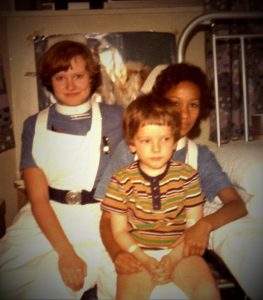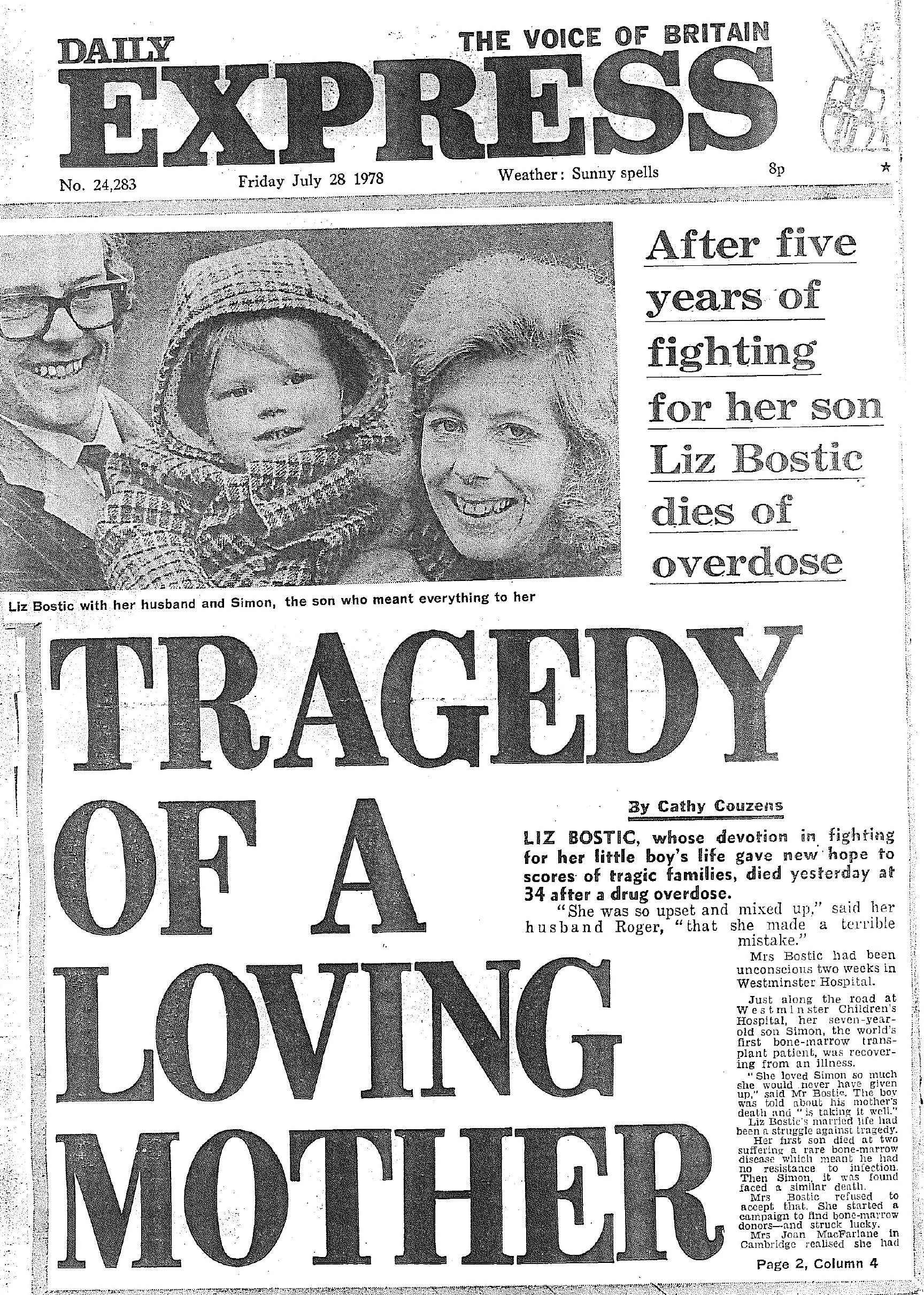That Day in July – Later
A Grief Suppressed
I don’t know how long my dad and I sat there in that room. Neither do I know what was more shocking for me at the time – the news of my Mum’s death or the howling cries I heard coming from my dad as he convulsed with all the pain of his grief, slumped sideways on the narrow single bed he had occupied for the last two weeks in the Mother’s Unit. I have a vague memory of sinking into a heap on the floor as we entered a time warp of shocked despair and visceral sobbing. Some minutes later, even an hour perhaps, Dad was able to pull himself together and find his glasses. Gathering ourselves sufficiently, we went back down to face my grim hospital cubicle.

Scattered moments from that day have since stuck in my mind, wedged in my consciousness by the brutal force of emotion. Nanny and grandpa arrived later. I leapt onto the lap of my mum’s mum, beloved as she was to me, burying my head in her shoulder, quite unable to look up and see anyone else. I remember saying, “What are we going to do now, Nanny?” She sobbed quietly, sniffling and whimpering now and again, numb with shock and disbelief. “She looked so beautiful and peaceful” was all she could say, over and again, as if she had glimpsed an angel. In her unpublished book about my mother called The Rainbow Through The Rain, she wrote:
My husband and I entered the sterile white room at The Westminster Hospital, where they had fought so hard to save her, and glimpsed eternity on the face of our daughter. The lines of worry and strain that had made her look older than her thirty-three years had vanished. Her skin was unscarred as it had been when she was a child. She looked so young and possessed of the peace that had eluded her in life. I believed then as I kissed her still warm skin, that she had found that After Life and was reunited with her little son, Andrew. The contented little half-smile that hovered on her lips was reassuring. “Oh how beautiful and happy she looks” I whispered to the kind Hospital Chaplain standing beside me. “I couldn’t wish her back to all her troubles.” “You will” he said gently and of course, he was right. This was a moment frozen, suspended in time – but for the living, time moves on and brings its delayed agony.
All day we sat in the sweltering little cubicle. Visitors, still oblivious to the news, arrived to what must have seemed like the aftermath of a chemical attack, all of us unspeaking, sniveling, sobbing. Globules of condensation started to form on the walls in sympathetic resonance with our tears, falling steadily to the floor. I remember peering out in search of a nurse and spotted the kind swan-like figure of Sister Cook – the lead nurse on the ward who over the years had become close to my mother. She was on the phone and had dropped to one knee as if in agony, one hand clutching her forehead, the other pressing the handset tightly to her ear. The news was clearly spreading as the day progressed.
“What are we going to do now, Daddy?” read the front-page headlines.
The media had pounced all over it. The tragic death of my mum had plunged our family once more into the goldfish bowl of public scrutiny. Our pain and suffering were on show for the entire world, including that she had died of a drug overdose taken in a moment of uncontrolled despair. That night, my grandmother wrote, the evening news led with:
Elisabeth Bostic, mother of Simon the first patient to receive a successful bone-marrow transplant from an unrelated donor, has died from a drug overdose in the Intensive Care Unit of the Westminster Hospital, after being in a coma for sixteen days.
 Nobody judged her. Not one journalist even so much as hinted it had been anything other than tragic and unintentional. Everyone praised her and many could empathize with her deep suffering, having both her children perilously affected by incurable disease. Tributes poured in for her unceasing work for the Andrew Bostic Appeal Fund that she founded in 1973, in memory of her elder son. The funds she raised helped to save thousands of children’s lives in the ensuing years thanks to research and better equipment. The Chairman of the fund, Professor John Hobbs, interviewed the following morning on the B.B.C.’s Today programme, said that in future the Fund would be known as The Andrew and Elisabeth Bostic Fund. “She was only an ordinary housewife” he said, “Yet she devoted so much of her time and energy to raising money to help other children, she deserves to be remembered”.
Nobody judged her. Not one journalist even so much as hinted it had been anything other than tragic and unintentional. Everyone praised her and many could empathize with her deep suffering, having both her children perilously affected by incurable disease. Tributes poured in for her unceasing work for the Andrew Bostic Appeal Fund that she founded in 1973, in memory of her elder son. The funds she raised helped to save thousands of children’s lives in the ensuing years thanks to research and better equipment. The Chairman of the fund, Professor John Hobbs, interviewed the following morning on the B.B.C.’s Today programme, said that in future the Fund would be known as The Andrew and Elisabeth Bostic Fund. “She was only an ordinary housewife” he said, “Yet she devoted so much of her time and energy to raising money to help other children, she deserves to be remembered”.
This woman was no “ordinary” anything – her strength and self-will drove her to the edge of what was possible, both physically and emotionally, for good and for ill. There was a darker side to this drive – a diagnosis of manic depression. Her extreme emotional energy gave her the drive to find a bone marrow donor for me five years earlier. Enlisting the aid of a large media organisation to publicize my plight she managed to persuade an otherwise very reluctant Westminster Children’s Hospital to undertake an unprecedented, high-risk procedure. If it had failed, the monetary and reputational costs would have been very high indeed with both senior NHS managers and the government. That it succeeded in making medical history and remained headline news in the tabloids for months, was testament to that drive – and also to her love for me.
 “Simon must never walk alone” was the headline, as donations poured in to the newly formed Simon Bostic Charitable Trust, a fund launched by the Daily Express to protect my future and help other children with blood diseases requiring bone marrow transplants. This was the second time the kindness and generosity of complete strangers so typical of the great British public had come to my rescue. A special fundraising show was put on at the Theatre Royal Drury Lane at very short notice, with many celebrities offering to take part. I remember becoming totally overwhelmed and running up a side road, stamping my feet and refusing to go back to the assembled host of celebs, headed by star drag performer, Danny La Rue. They had come to the hospital for a publicity photo shoot. How ashamed I felt when my Dad came and said if I didn’t want to do it, would I at least do it for him and for my Mum. I cringe now to think of the tantrum they witnessed.
“Simon must never walk alone” was the headline, as donations poured in to the newly formed Simon Bostic Charitable Trust, a fund launched by the Daily Express to protect my future and help other children with blood diseases requiring bone marrow transplants. This was the second time the kindness and generosity of complete strangers so typical of the great British public had come to my rescue. A special fundraising show was put on at the Theatre Royal Drury Lane at very short notice, with many celebrities offering to take part. I remember becoming totally overwhelmed and running up a side road, stamping my feet and refusing to go back to the assembled host of celebs, headed by star drag performer, Danny La Rue. They had come to the hospital for a publicity photo shoot. How ashamed I felt when my Dad came and said if I didn’t want to do it, would I at least do it for him and for my Mum. I cringe now to think of the tantrum they witnessed.
The noise of the media storm and the frenzy of posed pictures for newspaper articles seemed just never to end. With my consultants in my room where I had a little black and white TV, I remember watching my Father give an interview on Nationwide, a national TV news programme, begging the NHS not to cut funding to the transplant team at Westminster Hospital. Yet, as the days went by, it abated and I began to hear for the first time, what I assume still was the start of my own unquiet mind, my mania, my inner death wish. Screaming at first then reducing to a nagging pain – begging to be released and to be free to go with her.
2 Replies to “That Day in July – Later”
Hello Simon, I’m an Australian retired nurse, lived & worked in London at Westminster Children’s Hosp from 1977-1979 & although I worked in theatre I remember yours & Anthony Nolan’s history so very well.
I have just found this site & will continue to read your blogs.
You were such a brave little boy & we (WCH nursing staff) were devastated when your lost your mum.
You said you love to travel, have you been to Australia? After this Covid19 pandemic has been brought under control, if your ever come to Australia I’d love to meet up with you again. I live on the Bellarine peninsula in Victoria.
Best wishes & stay safe, Gail
Heartbreaking and beautifully written Simon. I didn’t know the press were all over it so much and for so long. More pressure on top of everything else to deal with. You really are an inspiration in so many ways. X